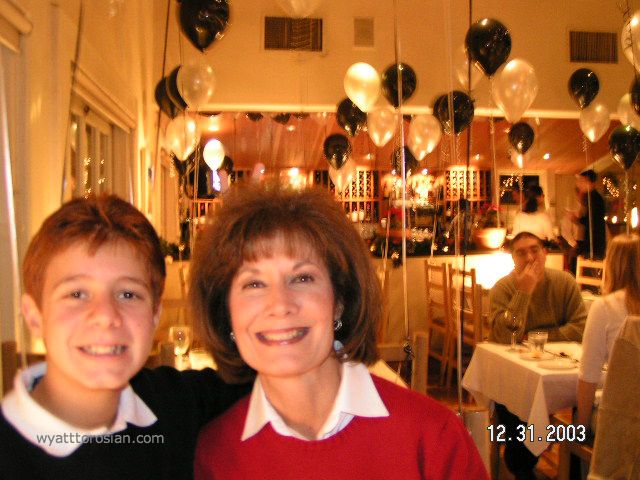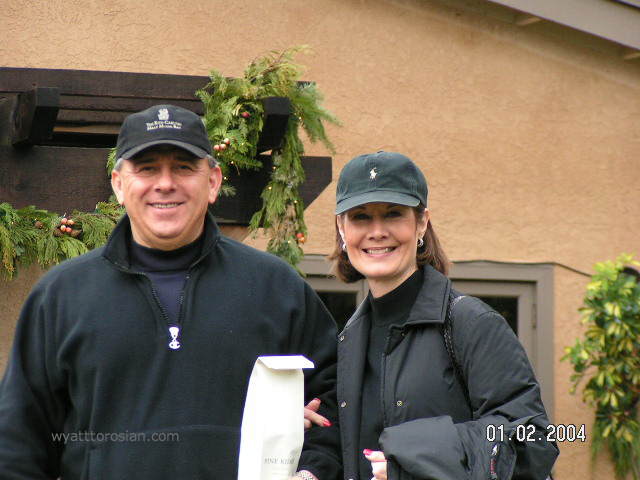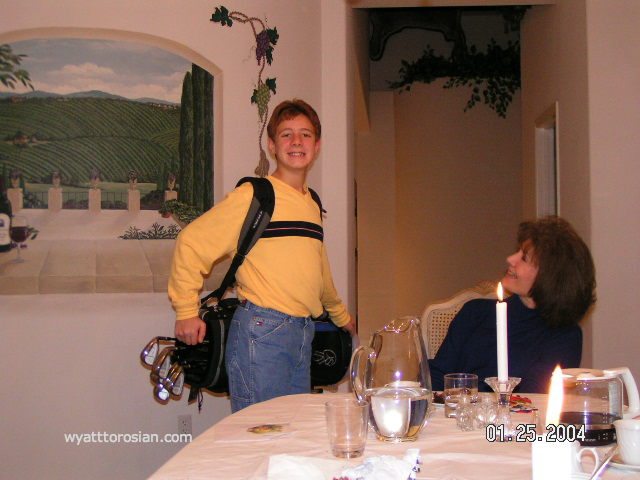Milestones are a strange reminder we’ve developed as part of our human experience to schedule out when we remember things. For painful memories it’s especially strange—why wait until one of these to notice a difference?
I get uncomfortable when people talk about their parents—more specifically, their mom. Usually they make generic statements about how their mom texts them all the time or how their mom found them on Facebook. I just sort of nod and mumble some sort of agreement in order to not feel so different from them, but my situation is very different.
Ten years ago today my mom suddenly lost consciousness behind the wheel of her truck as she drove out of my middle school where she was volunteering at that day’s book fair. Her vehicle crossed the center divider, amazingly avoided two lanes of oncoming traffic, poles, and trees, and drifted to a stop at a grassy knoll across from the school. Last time I drove by there, the tiremarks were still on the median.
An angel of a woman, Lisa Walker, saw what happened and ran to the window where my mom was slumped over the wheel. Immediately she called paramedics who had to break the back right window of the car—over the seat I had occupied on so many family vacations—and pulled her out of the driver’s seat to resuscitate her. When we got the car back, there was so much broken glass. Until we sold it sold years later—we kept finding broken glass. My mom had bought me a book and a poster at the book fair as a surprise gift. They were in the car as well—scratched up by the glass.
Her black Talbots shoes were still in the backseat too. Small. Suede. Fragile. Macabre.
My dad received a call at around 12:15PM from the sheriff that his wife was in an accident. His first question to the man was: “is she alive”? The sheriff paused, then responded that the paramedics were still trying to get her heart started. He turned his car and sped directly to the scene, with the sheriff pleading for him to go slowly and not get in an accident himself.
My mom received the same call only 8 years earlier when my dad had a heartattack on his airplane and was pronounced DOA as it landed at McCarran airport. Rarely in life do two people get to feel what the other one felt in a nearly identical life-or-death situation.
It was estimated that she had no blood pumping to her brain for at least 10 minutes. Scientists have determined that irreparable damage to the brain happens at that stage—usually sooner. After over three tries, the paramedics finally got a heartbeat and that they were taking her to Saint Agnes hospital.
While this was happening, someone in my Leadership class looked out the window and noticed an ambulance was across the street—alerting my teacher, Mrs. Capshaw. We gathered around the window and looked, but all we saw was the ambulance and a green pickup, the ambulance blocking anything else from view. I said a little prayer to myself hoping that person would be ok.
I don’t know what I would’ve done if I saw it was her. The scenario has run through my head hundreds of times—would I scale the 6-foot retaining wall outside the classes to get over there? Start screaming and crying? Get hit trying to cross the street? I determined it was good I didn’t find out.
At 1:45PM a golf cart came to my geometry class to pick me up. Some scary-looking woman walked up to the door and asked if “Matt Torosian” was there. I was hoping she was asking for Matt Sasaki and not me.
It was for me.
I knew I was in trouble for something. Was it about that fight I got in the other day? I’d never been picked up and sent to the office for anything before. What would my mom say? “Did you punch back?” It was the longest golf cart ride I’ve ever taken as I tried to hyperexamine what I possibly could’ve done wrong the past week.
We got to the office and I went into the principal’s. The secretary, the assistants—all of them had these downcast, troubled expressions. I didn’t know what to make of it. What could’ve possibly happened?
Why was my grandma there in her purple jacket and holding her purse? Why was she shaking?
My dad was on the phone and told me “your mom is in the hospital, she had a heartattack”. This didn’t shock me like it should have. After all—my dad had a heartattack and he was fine. But who would make dinner now?
It’s amazing how selfish your initial thoughts can be. My mom and I had gotten in an argument a couple days before over some girl I liked and how it was making my grades struggle in that class. Damned Allison Berryhill. At least I wouldn’t have to continue that argument with my mom now.
I hugged my grandma for longer than I had ever hugged her. I’d never seen her so upset before. This was not someone who ever this upset—she was just stern and had the occasional laugh to break up her permafrown.
I asked her if she wanted me to drive to the hospital but she said she would. She didn’t look like she was in any shape to drive—but I guess it was better to have a disturbed 82-year-old than a 13-year-old take the wheel. My mind was flooded with images of how happy my mom was from the night before at the Superbowl, from my birthday a week earlier. I desperately tried to piece together how this possibly could have happened to a relatively young, healthy woman.
We got there and everyone was there. All the grandparents. Aunts and uncles. Cousins. Everyone was sad and was trying to comfort me but I wasn’t feeling anything. I just knew my mom was going to come home that night and she’d be a little weak for a day or two but things would be ok.
It was awhile before I was allowed in to see her. Two by two we were allowed to go into the ICU, like this was Noah’s Ark or something. My grandma teared up and I walked in with this little frail old woman, supporting her more than she was supporting me. She had fallen not long ago walking out of our house and my mom broke her fall. I was careful to make sure that didn’t happen again.
I walked by what seemed like miles of ICU rooms—even though there were just 3, I ogled into the glass doors of each to see if she was in there.
We walked in and there she was, on ventilators and heart machines beeping and making that haunting inhale-exhale sound. She wasn’t awake. She wasn’t responsive. I quickly learned what a “coma” was. I didn’t understand. She’s just supposed to wake up, right? Why isn’t she waking up? Can’t she hear us?
The overcast skies grew hauntingly dark as the hours passed. As it approached 6PM they opened up in mourning, unleashing a torrent of rain.
I felt terrible. I couldn’t cry like them. I couldn’t cry like the people in the waiting room. Around 10 they told us it would be best to go home and let her rest, with the hope she’d wake up. My dad and I stopped and got Taco Bell on the way home—I remember looking at the dash of his Expedition and searing the digital time of 10:15 PM into my brain. The food was welcome because we were starving. It also tasted terrible because for the first time ever, it was just my dad and I at the glass dining table.
The other seat was empty.
I don’t remember much of those days, but I remember friends and relatives visiting and just staring at them. I remember my grandma breaking down in the waiting room the next afternoon and being afraid that she’d put herself in one of the hospital beds. I remember her wrinkled fingers clutching onto a tissue as tears flowed down her face and she asked, “what are we going to do without her?!”
My Aunt Sandy brought the family together to pray over my mom in a circle. Music and Bible verses were played over a small stereo because we were told it would help activate her brain function. Messages and notes and calls came in from everywhere. She touched so many lives that it seemed like everyone I had ever met convened at one point and place in time.
Nurses were sweet and wonderful, doctors less so. They burdened my dad to make end-of-life decisions within a matter of hours, helpfully adding that every day the chances grew more slim, at one point surpassing “one in a million”. Her eyes were open. She would occasionally mouth something that looked like words. Her fingers would twitch. We were told those were simply involuntary. No sign of life.
On the 14th, Valentine’s Day, a Saturday, she was up and smiling. Her eyes slowly tracked movements. When my dad and I told her what day it was, she said those three words that changed my life: “I love you.”
We called in all the relatives to go see her and they witnessed it too. The doctors weren’t there to see it. It was a Saturday. My dad and the other adults hoped she’d keep this up until Monday so they wouldn’t have to go back to describing how long it would take for her to die when they took out the ventilator (one hour) or the feeding tube (one day). Luckily nobody told me about this until afterwards. It was a good thing they didn’t—it was another point in time I would have just lost it. Still, my mind is haunted by “what could’ve been’s”—what if they took out either of those? I’d have to sit there for a day and watch my mom die as they starved her. What the hell is wrong with these sick bastards?
She slowly, but surely, began to recover day by day. She graduated out of the ICU and to a hospital room—which felt like the best graduation in the world. And further to a rehab facility, where she slowly learned to walk, talk, and perform small functions again.
A miracle had occurred.
I remember crying the day my grandma told me the story of how she made breadsticks. It was one of the only times while all this happened that everything seemed so real. I just imagined seeing my mom in the kitchen at the rehab center, wearing a chef’s hat and rolling the dough with supervision, happily and innocently making breadsticks how she had cooked every meal for years. It’s shocking when life confronts you with moments when you remember what you previously took for granted. It’s shocking when life reminds you of how fragile strong people can be.
New Year’s vacation and my birthday, the last photographed events before my mom’s accident
My mom still doesn’t remember what happened or what it was like when she was in the coma. It’s painful to see her get frustrated when she can’t remember events, names, faces or stutter when you know she’s trying to say something quickly in the moment and it overwhelms her system. Her case gives unique insight into how the human brain works. She remembers emotional events like weddings better than meals and everyday events. Certain memories, times, people get supplanted for others. Individuals are still there, but occupy different roles. Her mind can revert to 1978, then to 1993, then to a patched-together version of the present day, and rifle between without warning.
She’s never afraid to ask questions—who is that? What happened to (that relative that passed away)? The hardest thing is to watch her tear up when she realizes that people like her beloved godmother have died in the past few years and she has to experience it all over again, like it just happened. Even hearing that people she disliked pass away still elicits a reaction of profound sadness and loss.
My mom’s an exceptional conversationalist, when engaged. She usually prefers to sit and watch, but it’s amazing what a little scotch can do. Taking care of her has taught all of us the virtues of patience, simplicity, and gratitude.
Most importantly, she taught the value that no life is worthless.
This decade has not happened as I nor anyone imagined. I’ve spent so many hours of it thinking about what it would be like if things went differently—of how my mom with all her faculties would react to current events, or changes in my life or the times.
Most importantly, I’m grateful she’s still with us. I talked to her on the phone this morning, and towards the end of the conversation she said “I’m so glad we got a chance to talk…and probably more glad than you.”
I smiled and told her, “I don’t know about that”.



Leave a Reply